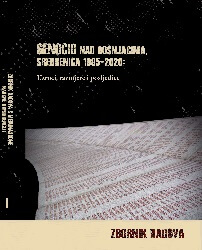Bol – centralni fenomen ljudske egzistencije u kontekstu počinjenog genocida nad Bošnjacima u Srebrenici
Pain – A Central Phenomenon of Human Existence in the Context of the Committed Genocide against Bosniaks in Srebrenica
Author(s): Rasim Muratović, Ermin Kuka
Subject(s): Social Philosophy, Local History / Microhistory, Victimology, Transformation Period (1990 - 2010), Philosophy of History
Published by: Institut za istraživanje zločina protiv čovječnosti i međunarodnog prava Univerziteta u Sarajevu
Keywords: pain; torture; evil; sadism; victim; culture; Srebrenica;
Summary/Abstract: Many will claim that life without pain is not a life. Yet, pain makes life so much harder to bear. In its fullness, pain takes life away from the present moment leading it into a longing for a time of its absence (even if this would mean the end of life itself). If life is defined by pain is it worth living? After all, we may not be experiencing pain in every moment but every moment carries a potentiality for pain. While its presence may vary from person to person, we all share this intimate exposure and vulnerability to pain and it is part of what defines us as humans. How we deal with pain on an individual level is not entirely in our control. Culture and the society we are embedded in provide us with the vocabulary for communicating pain and the stance on its value. The question then arises: How do we treat pain on a cultural and individual level? Bodily, sensory pain is perceived spontaneously, directly. Our bodies and their senses make us vulnerable to pain as well as susceptible to the pleasures of its opposites. Pain is defined as exclusively negative making our attitude one of resistance and the desire to be rid of it. This is, in itself, a result of a historically and culturally shaped vision. Simultaneously with avoiding it, however, we encourage and stimulate it, we seek it and it fascinates us. In any case, there is no indifference in or towards pain. When we are the ones inflicting it (torture, sadism), usually we seek explanations and further insight into this behavior. This paper aims to provide this insight. Torture and sadism, extreme forms of inflicting pain, were one of the instruments of committing genocide of Bosniaks in Srebrenica, July 1995. Our general conclusion is that pain, especially in its extreme form, cannot be perceived as anything other than pure negativity of human suffering.
- Page Range: 797-817
- Page Count: 21
- Publication Year: 2021
- Language: Bosnian
- Content File-PDF

